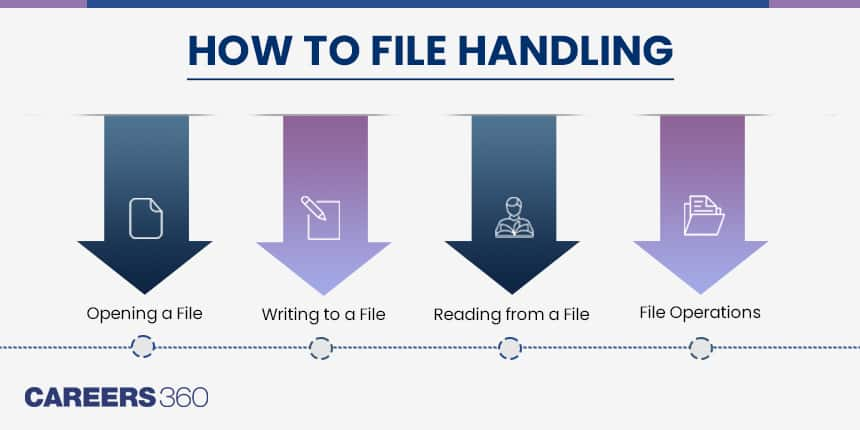JSS University Mysore 2025
NAAC A+ Accredited| Ranked #24 in University Category by NIRF | Applications open for multiple UG & PG Programs
File handling in C++ is an essential aspect of programming, allowing you to interact with external data sources such as text files, binary files, and more. In C++, working with files is made straightforward by providing a set of functionalities through the Standard Template Library (STL).
In this article, we C++ File Operations: Understanding How To File Handling In C++?will explore the basics of file handling in a C++ program, including how to open, write to, read from, and close files, along with code examples to illustrate each step to enhance your understanding of these essential file handling operations. Whether you are looking to create, modify, or simply access data stored in files, accelerating C++ file-handling programs is a valuable skill for a wide range of software development tasks. But before starting to learn about File Handling in C++, consider learning these C Certification Courses.

Also Read:
File handling functions in C++ refer to the ability to interact with files, including reading data from files, writing data to files, and performing various file operations. In file handling Cpp, file handling is typically achieved using the Standard Template Library (STL), specifically the fstream library.
This library provides classes and functions for working with files seamlessly. In this article, we will explore C++ file handling and provide examples of common file operations.
Basic File Handling Operations in C++
Basic File Handling Operations in C++ are fundamental tasks that allow programmers to interact with external data files efficiently. With the help of the Standard Template Library (STL) and its file stream classes, C++ offers a streamlined way to open, read from, write to, and manipulate files. This enables us to manipulate files with minimal lines of coding.
These operations are crucial for various applications, from reading configuration files to storing and retrieving data in persistent storage. In this section, we will explore the essential file-handling C++ program, providing clear examples and explanations to help you grasp the foundational concepts.
Also Read:
1. Opening a File
To work with files, you first need to open them. This can be done using the ifstream, ofstream, or fstream classes. Here are file handling in C++ example programs of how to open a file for reading, writing, and both reading and writing:
#include <iostream>
#include <fstream>
int main() {
// Opening a file for reading
std::ifstream inputFile("input.txt");
// Opening a file for writing
std::ofstream outputFile("output.txt");
// Opening a file for both reading and writing
std::fstream inOutFile("data.txt");
// Check if the file opened successfully before performing operations.
if (inputFile.is_open()) {
// File opened for reading - perform reading operations here.
inputFile.close(); // Close the file when done.
} else {
std::cerr << "Failed to open the file for reading." << std::endl;
}
if (outputFile.is_open()) {
// File opened for writing - perform writing operations here.
outputFile.close(); // Close the file when done.
} else {
std::cerr << "Failed to open the file for writing." << std::endl;
}
if (inOutFile.is_open()) {
// File opened for both reading and writing - perform operations here.
inOutFile.close(); // Close the file when done.
} else {
std::cerr << "Failed to open the file for reading and writing." << std::endl;
}
return 0;
}
2. Writing to a File
To write data to a file, you can use the << operator, just like you would with standard output. Here is an example:
#include <iostream>
#include <fstream>
int main() {
std::ofstream outputFile("output.txt");
if (outputFile.is_open()) {
outputFile << "Hello, File Handling in C++!" << std::endl;
outputFile << 42; // You can write variables and data types.
outputFile.close(); // Close the file when done.
} else {
std::cerr << "Failed to open the file for writing." << std::endl;
}
return 0;
}
3. Reading from a File
To read from a file, you can use the >> operator or the getline() function. Here is an example of reading from a file using ifstream and getline():
#include <iostream>
#include <fstream>
#include <string>
int main() {
std::ifstream inputFile("input.txt");
if (inputFile.is_open()) {
std::string line;
while (std::getline(inputFile, line)) {
std::cout << line << std::endl;
}
inputFile.close(); // Close the file when done.
} else {
std::cerr << "Failed to open the file for reading." << std::endl;
}
return 0;
}
4. File Operations
Apart from basic reading and writing, you can perform various file operations, including checking for end-of-file, seeking to specific positions in the file, and more. Here is an example demonstrating how to seek a specific position in a file:
#include <iostream>
#include <fstream>
int main() {
std::fstream file("data.txt");
if (file.is_open()) {
// Seek to the 5th character in the file.
file.seekg(4, std::ios::beg);
char character;
file >> character;
std::cout << "Character at position 5: " << character << std::endl;
file.close(); // Close the file when done.
} else {
std::cerr << "Failed to open the file." << std::endl;
}
return 0;
}
Related: C Certification Courses by Top Providers
Conclusion
C++ File Operations is a fundamental skill, allowing you to work with external data sources efficiently. With the fstream library, you can open, read, write, and manipulate files seamlessly. By understanding these basic file operations, you can perform a wide range of tasks, from data processing to configuration management, and more.
Always remember to handle errors and close files properly to ensure the integrity of your code and accelerate your career as a proficient Computer programmer.
In C++, the main file handling classes are ifstream (Input File Stream), ofstream (Output File Stream), and fstream (File Stream). Use ifstream when you need to read from a file, ofstream when you want to write to a file, and fstream when you need both read and write access to a file.
You can use the .is_open() method on file stream objects to check if a file was successfully opened. It returns true if the file is open and false if the opening operation fails.
When writing to a file, you can use the << operator to write data to the file, similar to how you would with standard output. You can write various data types, including strings, numbers, and other variables.
To read data from a file, you can use the >> operator for reading individual values and the getline() function for reading entire lines. You typically use ifstream objects for reading from a file.
Closing files is crucial for ensuring that any changes made to the file are properly saved, and it releases system resources associated with the file. Failure to close files can lead to data corruption and resource leaks.
Application Date:16 April,2025 - 18 May,2025

Ranked amongst top 3% universities globally (QS Rankings)

NAAC A+ Grade | Among top 100 universities of India (NIRF 2024) | 40 crore+ scholarships distributed

Advanced curriculum designed to build expertise in specialized science domains like Data Science, Biotechnology, Physics, Chemistry, and more.

MSc Finance and MSc International Management Admissions 2025 Now Open | Ranked Among the Top 100 Universities in the World by QS World University Rankings 2025 | Application Closing Soon!
Ranked amongst top 3% universities globally (QS Rankings)
Ranked #46 amongst Universities in India by NIRF | 1900+ Students Placed | 94% Placement | 633+ Recruiters | Last Date to Apply: 18th May